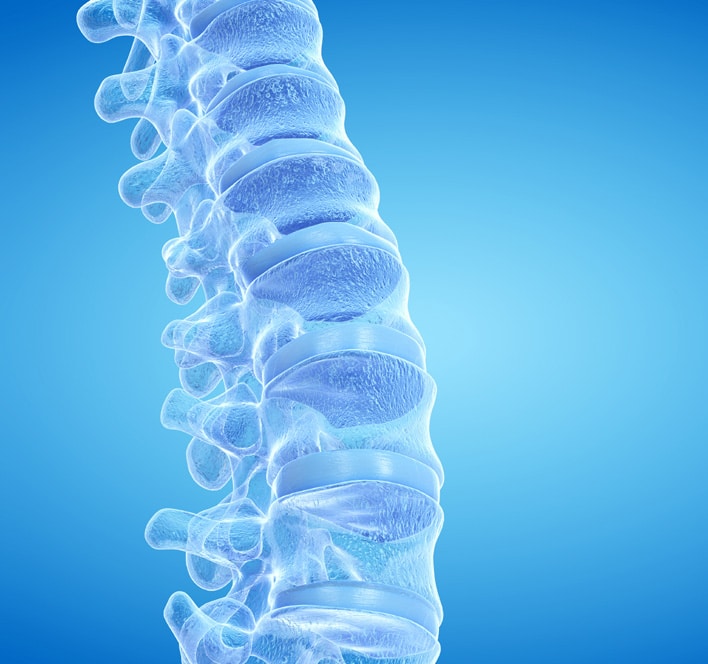Spine deformities can cause a range of symptoms, from mild to debilitating. Kyphosis can disrupt your quality of life and may lead to chronic pain if not treated properly.
Depending on why your spine is curving, our orthopedic kyphosis specialists at NJ Spine & Orthopedic can evaluate your medical records to help create the best treatment for your kyphosis condition. If conventional treatments don’t relieve symptoms resulting from your spine curvature, we may recommend minimally invasive surgery to get your life back to the way it was.
What is Kyphosis?
Kyphosis is the curvature of the thoracic spine and will result in a rounded or hunched back. Even though an upper back appears straight for normal posture, the thoracic spine is typically curved 20 to 45 degrees. When the thoracic spine starts to bend more than 45 degrees, this is considered a kyphosis condition.
If the curve is slight, you might only see a minor change to the shape of your back. As the curve worsens, the symptoms often intensify. It may result in severe deformity, nerve problems, and chronic pain. Other symptoms that can occur in addition to the rounded-back appearance include:
- Pain in the middle or lower back and shoulder blades
- Tenderness and stiffness in the spine
- Fatigue
- Balance issues
Fatigue is a common symptom because your muscles, ligaments, and bones have to work very hard to perform simple tasks in this condition. When the spine is severely curved, it can press against airways, causing breathing problems. Kyphosis also can result in losing control over your bowels and bladder.
Causes of Kyphosis
This condition can manifest in children and adults for various reasons, but the causes can differ. Kyphosis can develop in children and teens because of slouching, metabolic issues like diabetes, or congenital or familial disorders. Examples of genetic diseases that can cause kyphosis in children and teens are:
- Brittle bone disease
- Spina bifida
- Cerebral palsy
- Scheuermann disease
The most likely causes for adults are degenerative diseases or issues resulting from trauma. Osteoporosis can affect the vertebrae bones and discs in the spine, causing them to deteriorate and become damaged, leading to gradual kyphosis. Sports-related or post-traumatic injuries, such as vertebrae bone fractures and disc damage, can also cause some degree of kyphosis. A weakened spine or the surrounding ligaments may not be strong enough to support the vertebrae, which allows the spine to curve.
Treatments for Kyphosis
Curving of the spine usually slows or stops after puberty but should be monitored to prevent it from worsening. If the child is still growing, wearing a brace will help strengthen the spine and guide the spine to grow straighter. When slouching or posture is a problem, exercises will help correct it.
Any kyphosis-related pain can also be treated with over-the-counter pain relievers like ibuprofen. If wearing a brace is not slowing down the progression of the curve or the curve measures 75 degrees or more, your child may need surgery.
For adults, the treatments are the same but for different reasons. For example, braces are recommended for adults for not straightening the spine because they are no longer growing, but for pain relief. Other treatments include:
- Pain relief medication
- Physical therapy to counteract the effects of kyphosis and provide pain relief
- Surgery
If osteoporosis is the reason for kyphosis, you can treat your osteoporosis condition and slow down the progression by increasing your calcium and vitamin D intake and utilizing weight-bearing exercises. And, of course, surgery should be considered as the last resort.
Turn to the Kyphosis Specialists at NJ Spine & Orthopedic
The kyphosis specialists at NJ Spine & Orthopedic can help by conducting a thorough physical exam, checking your height, and taking X-rays to confirm the presence of spine curvature. Once they determine a kyphosis condition, they can recommend treatments that can help relieve symptoms.
Our orthopedic doctors at NJ Spine & Orthopedic are the leading experts in spine curvature conditions, such as kyphosis. If you need to be treated for kyphosis and any resulting symptoms, call (866) 553-0612 or complete our contact form. Our Concierge Team can also help you coordinate everything.

